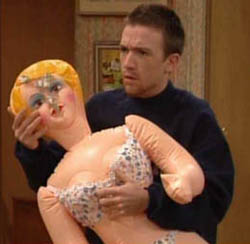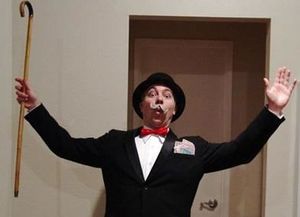RadioShack
RadioShack is an international chain of retail electronics stores. It currently employs between 75–100 people and is spread throughout much of the United States, Mexico, and Guatemala with a heavy concentration of stores located in Eugene, Oregon. Despite its popularity as an electronic retailer it derives a large portion of its sales from the back-room sale of adult toys, videos and other sexually stimulating items.
RadioShack grew from its humble beginings to a multi-national chain through the leadership of some of the nation's greatest business people. In the 1980s, 1990s, and early-mid 2000s, it flourished, but for the past decade or so, has been floundering.
History[edit | edit source]
The first Radio Shack store opened for business as a Baskin-Robins(no relation to the current ice cream chain) in 1912 in the town of Omaha, Nebraska. It was the first combination of a sex toy shop and brothel west of the Mississippi River. Baskin-Robins was founded by Hilary Baskin and Mary Robins, members of the militant women's rights group Free Vaginas Now, which was started by none other than Susan B. Anthony. Business started slowly as many men were hesitant to solicit to a militant women's group, however within due time word spread of the large assortment of sexual devices and accessories, and their acclaimed talent of performing fellatio.
Baskin-Robins' first took off during the sexual revolution of 1919. Soldiers returning home from the First World War were told of its exotic assortment of sexual devices and the quality of its prostitutes. It opened a door for many otherwise conservative Americans looking to spice up their sex lives by purchasing a number of lotions and lubricants, toys, leather chapps, ben wah balls, whips, ball gags, slings and, of course, dildos. During the revolution between 1919-1925 Baskin-Robins expanded to over 100 stores throughout the western US.
Unfortunately 1930 was a difficult year for Baskin-Robins. Congress had passed the Anti-Harlotry Bill of 1930 that banned prostitution, and later that year its president, Anita Cock, choked to death in a work related incident. Things were looking bleak for the company, but new technology was about to take the company in a direction no one expected.
Electronics and Technology[edit | edit source]
No one could have foreseen that what was once a small brothel and sex toy shop would become the company it is today due in large part to one item: the battery. Batteries had been around for practically centuries but during the early 1930s strides had been taken that allowed them to be small enough to fit into adult toys. It was new Baskin-Robins' president Hugh G. Rection who decided they should take advantage of the battery for their benefit. Immediately he started a research group to use batteries in their sex toys. Sales of newly invented vibrating dildos, penis rings and clitoral stimulators were through the roof.
Before they knew it Baskin-Robins had not only cornered the market on sexual stimulators but had also somewhat surprisingly become the new leader in the advancement of batteries. Since sex toys came in all shapes and sizes BR had developed different types of batteries to fit their products accordingly. Realizing their advancement in batteries could potentially bring them to a crossroads in their business, they decided to consult Jamal Hawking, Stephen Hawking's father, for advice. His recommendation was that they should continue leading the nation in battery production while still giving customers a choice to buy sex toys through magazines or on the internet if they choose. Following his advice they decided to re-vamp their image and name. Eventually they decided upon Radio Shack since radios designed to pick up sexually explicit broadcasts had been their biggest non-sex toy product.
Moving Forward[edit | edit source]
Under their new image Radio Shack flourished at an alarming rate. With a healthy mix of nerds and perverts the once small operation now had just over 30,000 stores and was producing annual sales of nearly $1,000,000, making it the world's largest retailer. People coming to Radio Shack were sucked in with catchy ad slogans such as, "You're gay if you don't shop at Radio Shack", and "Seriously, you're gay if you don't shop at Radio Shack." This was odd and somewhat controversial as in prior years a large portion of their customers were members of the gay and lesbian community. Since then President Faustino has been quoted as saying, "It matters not what customers visit our boutiques. It is our honor to provide these ladies and gents with the care and respect they deserve."
Dress Code and Regulations[edit | edit source]
When Radio Shack made the formal change to electronic retailer dress code was one of the biggest policy changes. The decision had been made that they should follow formal business attire, requiring all employes to wear a suit and tie. It has become more lenient and most any clothes that cover over 40% of one's body is considered acceptable. Grooming is no longer a major concern of the company and associates are no longer required to bathe, use beauty products, etc, as long as they meet their goals. When questioned about this policy Vice President and COO Matt Stone said, "As long as those fuckers meet their goals I don't care if the store reeks of cat piss and vomit."
Company policy has also moved from the original practice of associates carrying sexual devices through the store to demonstrate to cellular phones or other types of electronics. It was decided that while the demonstration of sexual devices could potentially draw more store traffic it might also draw lawsuits. This change applies only to stores in the United States, where are stores in Mexico, Guatemala and Store 3048 still fall under the old policy.




